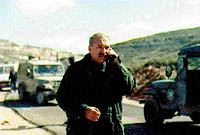
The real heroes of the day were the members of the Birzeit University Administration, such as Dr. Mohammed Sarsour, Vice President for Finances (pictured left), and Dr. Carmela Omari-Armanios, the Registrar.
They patiently talked with the soldiers, reasoning that it would be better for them to let students through to get to the university than to have large groups of them milling around near the checkpoint, that access to the university would a normalising effect on the situation.
They also calmed the students and, in the end, secured a passage for them to go. By this time, however, the university had lost a day. I rushed back to the Public Relations Office to write a press release to send out on the Internet.
With a university community of 5,000 members, measures such as this effect a severe disruption to not only the university, but the life of the surrounding community. University staff who are paid by the day lose salary. Taxi drivers lose a day's income.
The continuing Israeli practice of collective punishment represents a violation of Articles 13 of the Universal Declaration of Human Rights and Article 33 of the Fourth Geneva Convention. This in turn represents a violation of the Oslo accords' clause on "respecting" human rights.
At the time of writing the release, in the afternoon, there was only limited passage between Ramallah and the university and therefore classes were cancelled for the day, while Birzeit administration members continued to negotiate with Israeli authorities.
Birzeit University has, time and time again, restated the right of its students to their education unhindered. Israel cannot continue to undermine this right by preventing freedom of movement between Oslo areas "A" and "B". Today's events represented the first serious test of the Oslo accords for the university. It did not bode well for the future.

On the way back from the university there were again problems, this time concerning being allowed back in to Ramallah (pictured right). As the soldiers had already promised Birzeit administration members that staff and students could pass, Public Relations director Albert Aghazarian, arranged with the soldiers to help implement this by identifing returning Birzeit students, staff and faculty so that they could pass unhampered to Ramallah.
We returned home with sadness. We had all hoped that the "bad old days" of indirect closures of the university by checkpoints were over. What we didn't know at this time was that we were yet to be further disappointed.